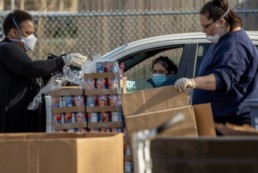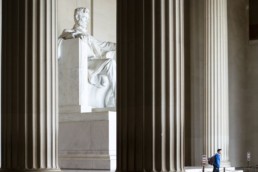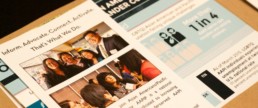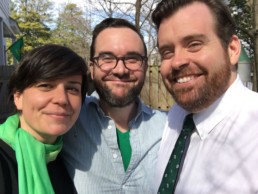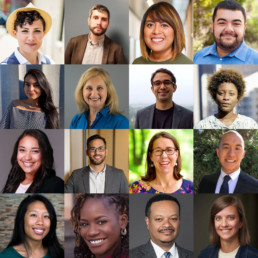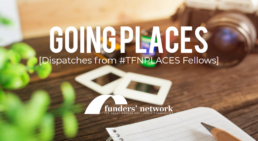Nonprofits employ nearly 500K Michiganders. They need SBA Payroll Protection Program funds
By Wendy Lewis Jackson and Aaron Seybert, The Kresge Foundation
TFN members Wendy Jackson and Aaron Seybert from The Kresge Foundation recently share their reflections on how the SBA Payroll Protection Program funds are vital to supporting Detroit's nonprofit sector with the Detroit Free Press. Wendy, a former TFN board member, is currently the co-chair of TFN's Inclusive Economies working group.
"From feeding the hungry, to supporting COVID-19 testing and contact tracing, nonprofits are integral to confronting the pandemic in Detroit, across Michigan and across the country.
But the nonprofit sector is itself badly battered economically and deeply in need of substantial, targeted support. Nonprofits are anxiously awaiting a new round of the federal Payroll Protection Program, which is up for debate in Congress this week. If it passes, it would need to be followed by ardent support and prioritization of nonprofits from local lenders and state officials.
According to the Michigan Nonprofit Association, nonprofits employed nearly 470,000 people in the third quarter of 2018. This number represents just over one in 10 of Michigan’s total nonfarm jobs, and is larger than Michigan’s leisure and hospitality industry.
In Detroit, this sector is particularly vital. Nonprofits are the institutional first responders working shoulder to shoulder with government to flatten the curve and meet emergency needs. Nonprofits make up the civic and societal muscle that’s worked to revitalize our community, and will be essential in rebuilding after the financial storm has passed."
Read the rest of this op-ed here.
About the Authors

Wendy Lewis Jackson is managing director for the Detroit Program. She leads The Kresge Foundation’s efforts to revitalize Detroit and to strengthen its social and economic fabric. Her work supports organizations providing economic opportunity for low-income people and addresses the needs of vulnerable children and families.

Aaron Seybert is managing director of the Social Investment Practice at The Kresge Foundation. He previously served as a social investment officer supporting the American Cities and Detroit Programs at Kresge. He joined the foundation in 2016. Prior to Kresge, he served as executive director at JPMorgan Chase Bank, where he was involved with community development banking focused on New Markets Tax Credits and Historic Tax Credit investing.
A Note From Home
By Darren Walker, President, Ford Foundation
TFN member Darren Walker is president of the Ford Foundation, an international social justice philanthropy with a $13 billion endowment and $600 million in annual grant making. He chaired the philanthropy committee that brought a resolution to the city of Detroit’s historic bankruptcy and is co-founder and chair of the US Impact Investing Alliance.
Today on the Ford Foundation's blog Equals Change, Darren shared his reflections on the Covid-19 virus, the role he thinks funders can play in recovery and our need as a people for caution, courage and calm during these trying times.
"Dear colleagues and friends:
During these strangest of days, one cannot help but feel disoriented.
Our circumstances—and the way we make sense of them—are evolving so rapidly that, even as I draft these lines, I cannot know which will hold true tomorrow or the day after, much less during the weeks and months ahead.
The strangeness takes many different forms. As I work from home—practicing the “social distancing” that the experts counsel—the speed of news, closures, and conference calls is juxtaposed with an unsettling quiet. No one is bustling around my home office the way they would the Ford Foundation corridors.
How can things be moving so fast, and also so slowly?
And yet, I recognize that my lockdown in a Manhattan apartment, while hard for me to process, is certainly no hardship. Those of us who benefit from such privilege would be well served to remember this during the days and months ahead. Far too many are facing real hardships: frontline healthcare professionals, as well as retail, hotel and restaurant workers, and others for whom survival depends on hourly and tipped wages.
And yet, I recognize that my lockdown in a Manhattan apartment, while hard for me to process, is certainly no hardship. Those of us who benefit from such privilege would be well served to remember this during the days and months ahead. Far too many are facing real hardships: frontline healthcare professionals, as well as retail, hotel and restaurant workers, and others for whom survival depends on hourly and tipped wages.
No matter where we find ourselves, though, we share the anxiety that comes with staring straight into the unknown—even if we’ve already been living with some elements of this altered reality. In many ways, the COVID-19 crisis is an extreme extension of trends and feelings of uncertainty that have defined the last few years: The unprecedented has become the ordinary, in nearly every facet of life.
Despite all of this, or perhaps because of it, I have been reflecting on the timeless words of Dr. Martin Luther King Jr.:
We are caught in an inescapable network of mutuality, tied in a single garment of destiny. Whatever affects one directly, affects all indirectly.
As the pandemic and its consequences threaten lives and livelihoods, we see—yet again—just how inextricably our fates and fortunes are intertwined. We see how each of us is directly, and indirectly, responsible for those around us."
Read the rest of his blog here.
About the Author
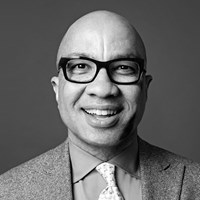
Darren Walker is president of the Ford Foundation, an international social justice philanthropy with a $13 billion endowment and $600 million in annual grant making. He chaired the philanthropy committee that brought a resolution to the city of Detroit’s historic bankruptcy and is co-founder and chair of the US Impact Investing Alliance.
Before joining Ford, Darren was vice president at the Rockefeller Foundation, overseeing global and domestic programs including the Rebuild New Orleans initiative after Hurricane Katrina. In the 1990s, as COO of the Abyssinian Development Corporation—Harlem’s largest community development organization—he oversaw a comprehensive revitalization strategy, including building over 1,000 units of affordable housing and the first major commercial development in Harlem since the 1960s. Earlier, he had a decade-long career in international law and finance at Cleary Gottlieb Steen & Hamilton and UBS.
Darren co-chairs New York City’s Commission on City Art, Monuments, and Markers, and serves on the Commission on the Future of Rikers Island Correctional Institution and the UN International Labor Organization Commission on the Future of Work. He also serves on the boards of Carnegie Hall, the Smithsonian’s National Museum of African American History and Culture, the National Gallery of Art, Art Bridges, the High Line, VOW to End Child Marriage, the HOW Institute for Society, the Global Steering Group for Impact Investment, and the Committee to Protect Journalists. He is a member of the Council on Foreign Relations and the American Academy of Arts and Sciences, and is the recipient of 13 honorary degrees and university awards, including the W. E. B. Du Bois Medal from Harvard University.
Educated exclusively in public schools, Darren was a member of the first class of Head Start in 1965 and graduated from the University of Texas at Austin, which in 2009 recognized him with its Distinguished Alumnus Award—its highest alumni honor. He has been included on numerous annual media lists, including Time’s annual list of the 100 Most Influential People in the World, Rolling Stone’s 25 People Shaping the Future, Fast Company’s 50 Most Innovative People, and Out magazine’s Power 50.
We Must Be Committed Now More Than Ever To Raise Our Voices
By Pat Smith, President and CEO, The Funders' Network
Dear TFN members and friends,
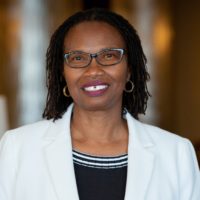
As a membership organization committed to centering racial equity and justice in our work, we are alarmed and appalled by recent reports of racist and xenophobic attacks against Asian Americans, Pacific Islanders, and others of Asian descent living in our communities. As we wrestle with the devastating health, economic and social impacts of the global coronavirus pandemic, we are mindful that social distancing does not equal willful silence.
We must be committed, now more than ever, to raise our voices in solidarity with those targeted by hateful rhetoric and actions.
We are proud to sign on to this open letter authored Asian Americans and Pacific Islanders in Philanthropy (AAPIP) and published in the Chronicle of Philanthropy - “Open Letter to Philanthropy: The Cure to Viral Racism Is Within Our Hands.”
TFN encourages you to join us in signing on to this letter as a sign of empathy and solidarity with the AAPI community. We also encourage you to adopt and amplify the calls-to-action outlined in the letter, which exhorts colleagues in philanthropy to:
| Include language in statements that denounce hate related to COVID-19 (and beyond). |
| Include efforts that address viral racism as part of rapid response fund guidelines. |
| Insert equity into outreach efforts and funding decisions to ensure that smaller organizations, especially those in harder hit communities and inclusive of AAPIs are part of that mix. |
| Reach out to AAPI staff members and colleagues to see how they are doing and offer support. |
| Speak out when you see racism and prejudice against any individual or community. |
| Think of this moment as a “reset” button to imagine a more holistic approach to philanthropy that gains new traction toward racial and gender equity. |
You may read the full letter along with the list of organizations that have signed on in support here.
TFN has also compiled an online library, Resources and Responses from the Philanthropic Sector, which we hope will be helpful in navigating the many implications the pandemic will have for the people and places we care about, while keeping the values of equity, inclusion and justice front and center.
If you would like to share news or resources about the pandemic with the TFN audience, please reach out to Marci Ovadia.
Wishing you good health and wellbeing,
Pat Smith
TFN President & CEO
Open Letter to Philanthropy: The Cure to Viral Racism Is Within Our Hands
By Patricia Eng, President and CEO, Asian Americans/Pacific Islanders in Philanthropy (AAPIP)
TFN encourages our members to visit our working resource library on the TFN blog, which we hope will be helpful to funders navigating the impact the coronavirus pandemic will have on the people and places we care about, while keeping the values of equity, inclusion and justice front and center.
This joint statement was included as part of an article "Asian American Grant Makers Call on Philanthropy to End Violence and Bias on the Rise as Coronavirus Spreads" published in The Chronicle of Philanthropy 4.8.2020.
Dear Colleagues,
While Covid-19 may be novel, the racism accompanying it is far from new. Racial bigotry and “xenophobia” is ravaging Asian American communities in the U.S. alongside the physical impacts of COVID-19. It is reminiscent of attacks against South Asians, Arab and Muslim Americans after 9/11, brewed from anti-Blackness and the all-too familiar racial profiling of Black, Brown, and Native American people just going about their lives. We thank those that stand in support of Chinese and Chinese Americans during this period as we stand in solidarity with others who have and continue to experience racism and bigotry.
Scapegoating of Asian Americans is fueled by fear and racism simmering just below the surface. When it comes from our country’s top leaders, whether direct or implied, it signals an official stamp of acceptance and puts Asian Americans in harm’s way, including children. There are more than 21 million Asian Americans and Pacific Islanders (AAPIs) in the U.S., comprising the fastest growing racial group, and they too are impacted, especially health care workers and others providing essential services who are risking their lives to save others. And philanthropy is not immune. Our staff and colleagues are also impacted by a variety of aggressions, externally or even within our own work environment when minimized or ignored.
Through every crisis, philanthropy responds. Some foundations have acknowledged the need to address racism in their COVID-19 response. Asian American community foundations, giving circles, and other mutual aid solutions are stepping up to support the community, both to address COVID-19 as well as the unique harms to Asian Americans. Asian and Asian American philanthropists are also stepping up to be part of the larger COVID-19 solution, including but not limited to, donating personal protection equipment for American health care workers.
All of this is a great start, but much more can be done. The cure to viral racism is within our hands. We call on our colleagues to:
· Include language in statements that denounce hate related to COVID-19 (and beyond).
· Include efforts that address viral racism as part of rapid response fund guidelines.
· Insert equity into outreach efforts and funding decisions to ensure that smaller organizations, especially those in harder hit communities and inclusive of AAPIs are part of that mix.
· Reach out to AAPI staff members and colleagues to see how they are doing and offer support.
· Speak out when you see racism and prejudice against any individual or community.
· Think of this moment as a “reset” button to imagine a more holistic approach to philanthropy that gains new traction toward racial and gender equity.
Let’s think expansively about this country’s future and support a path to finding our full humanity based on trusted relationships. In this pandemic, it is abundantly clear that we are one people with a shared destiny. Let’s close this country’s chapter on the tired and harmful stereotypes along with this novel virus. Our collective health is strengthened by our shared humanity and our best allies are common sense and good will. Through every such crisis and every day in between, solidarity matters.
SIGNATORIES
This letter is signed by the following foundations and philanthropic organizations alongside individuals listed below. Please note that individuals have added their names, with titles and affiliations for identification purposes only and this does NOT constitute institutional endorsement (that is recorded in the institutional section).
While these types of letters are typically signed by the heads of foundations and philanthropic entitities, we felt it was important for AAPI voices at all leadership levels in philanthropy to be included, alongside our powerful allies. Some foundation executives and trustees selected to also include their names as individuals alongside their institutional endorsements for additional emphasis and expression of personal solidarity. This includes more than 50 AAPI top level executives and trustees of foundations and philanthropic serving organizations. Many individuals listed have multiple connections and touchpoints in philanthropy, but chose a specific identification for the purpose of this letter.
The people behind these signatures hail from points all across the country, from coast to coast and points in between. They are not simply perfunctory sign-ons. They represent a heartfelt urgency to continue the hard work of moving beyond racial bias during crises like this, to come out more fully whole as a country.
The people behind these signatures hail from points all across the country, from coast to coast and points in between. They are not simply perfunctory sign-ons. They represent a heartfelt urgency to continue the hard work of moving beyond racial bias during crises like this, to come out more fully whole as a country.
FOUNDATIONS & PHILANTHROPY SERVING ORGANIZATIONS (list in formation - request to sign on here.)
AAPI Civic Engagement Fund (national)
ABFE: A Philanthropic Partnership for Black Communities (national)
Akonadi Foundation (national)
Alexandria Area Community Foundation (MN)
Amalgamated Charitable Foundation (national)
APIs Rise Giving Circle (CA)
Arizona Grantmakers Forum (AZ)
Asian Americans & Pacific Islanders in Philanthropy (national)
Asian Giving Circle (IL)
Asian Mosaic Fund Giving Circle of Greater Philadelphia (PA)
Asian Pacific Community Fund (CA)
Asian Women Giving Circle (NY)
Barr Foundation (MA)
Bayanihan Foundation Community Power Giving Circle (CA)
Beyond Two Cents: LGBTQ AAPI Giving Circle (national)
Biodiversity Funders Group (national)
Blue Sky Funders Forum (national)
Blue Shield of California Foundation (CA)
BMPP Giving Circle (MN)
Borealis Philanthropy (national)
Brainerd Lakes Area Community Foundation (MN)
Brooklyn Community Foundation (NY)
California Wellness Foundation (CA)
Center for Effective Philanthropy (national)
Central Minnesota Community Foundation (MN)
CHANGE Philanthropy (national)
Cherry Blossom Giving Circle (DC)
Chicago African Americans in Philanthropy (IL)
Chinook Fund (CO)
Colorado Health Foundation (CO)
Common Counsel Foundation (national)
Community Foundation for Northern Virginia (VA)
Community Giving (MN)
Connecticut Council for Philanthropy (CT)
Council of NJ Grantmakers (NJ)
David Bohnett Foundation (national)
Devata Giving Circle (CA)
Dinner Guys Giving Circle (NY)
Donors of Color Network (national)
East Bay Community Foundation (CA)
Emerging Practitioners in Philanthropy (national)
Environmental Grantmakers Association (national)
Evelyn & Walter Haas Jr Fund (CA/national)
Fairfield County's Community Foundation (CT)
Florida Philanthropic Network (FL)
Ford Foundation (national/global)
Forefront (IL)
Foundation for Child Development (national)
Four Freedoms Fund (national)
Friends Doing Good Giving Circle (CA)
Funders Concerned About AIDS (national)
Funders for LGBTQ Issues (national)
Funders for Reproductive Equity (national)
Funders Network for Smart Growth & Livable Communities (national)
Funders Together to End Homelessness (national)
Grantmakers Concerned with Immigrant & Refugees (national)
Grantmakers for Education (national)
Grantmakers in Aging (national)
Grantmakers in the Arts (national)
GRANTMAKERS of Oregon and Southwest Washington (WA)
Greater Tacoma Community Foundation (WA)
Group Health Foundation (WA)
Health & Environmental Funders Network (national)
Hella Heart Giving Circle (CA)
Hispanics in Philanthropy (national)
Hyams Foundation (MA)
Jessie Smith Noyes Foundation (national)
JustFund (national)
Kenneth Rainin Foundation (CA)
Kibei Giving Circle (WA)
Korean American Community Foundation (NY)
Korean American Community Foundation of San Francisco (CA)
Lacuna Giving Circle (CA)
Liberty Hill Foundation (national)
Lincoln Community Foundation (NE)
Los Angeles Asian American & Pacific Islander Giving Circle (CA)
Lumina Foundation (IN/national)
Maine Philanthropy Center (ME)
Marguerite Casey Foundation (national)
McKnight Foundation (national)
Meyer Memorial Trust (OR)
Minnesota Council on Foundations (MN)
Ms. Foundation for Women (national)
National Committee for Responsive Philanthropy (national)
Native Americans in Philanthropy (national)
Neighborhood Funders Group (national)
Nellie Mae Education Foundation (NE Region)
NEO Philanthropy (national)
New Breath Foundation (national)
New Hampshire Charitable Foundation (NH)
New Mexico Association of Grantmakers (NM)
North Star Fund (NY)
Northern California Grantmakers (CA)
Northside Funders Group (MN)
Northwest Area Foundation (NW region)
Open Society Foundations (national/global)
Orange County Grantmakers (CA)
Orchid Giving Circle at Texas Women’s Foundation (TX)
Philanthropic Initiative for Racial Equity (national)
Philanthropy California (CA)
Philanthropy Colorado (CO)
Philanthropy Massachusetts (MA)
Philanthropy New York(NY)
Philanthropy Ohio (OH)
Philanthropy West Virginia (WV)
Proteus Fund (national)
Race Forward (national)
Resource Generation (national)
San Diego Grantmakers (CA)
San Francisco Foundation (CA)
Satterberg Foundation (WA & CA)
Seattle Foundation (WA)
Sheng-Yen Lu Foundation (WA)
Silicon Valley Community Foundation (CA)
Silicon Valley Giving Circle (CA)
Skoll Foundation (national/global)
Solidaire Network (national)
Southeastern Council of Foundations (southern region)
Southern California Grantmakers (CA)
Southwest Initiative Foundation (MN)
Stupski Foundation (CA)
Sustainable Agriculture & Food Systems Funders (national)
Tarsadia Foundation (national/global)
The Boston Foundation (MA)
The California Endowment (CA)
The Communications Network (national)
The Community Foundation for Greater New Haven (CT)
The Lenny Zakim Fund (MA)
The Libra Foundation (national)
The New York Women's Foundation (NY)
Tides (national)
Tides Advocacy (national)
Tufts Health Plan Foundation (MA)
Unbound Philanthropy (national/global)
United Philanthropy Forum (national)
W.K. Kellogg Foundation (national)
William T. Grant Foundation (national)
Willmar Area Community Foundation (MN)
Wisconsin Philanthropy Network (WI)
Women's Foundation of California (CA)
INDIVIDUALS (request to sign on here.)
For the list of individuals who have signed on to this open letter, click here.
The Rescue We Seek
By Grant Oliphant, President, The Heinz Endowments
TFN member Grant Oliphant has been President of The Heinz Endowments since 2014 and has been a positive force in philanthropy and public service for nearly three decades. A leading proponent of the idea that philanthropy must be vocal in the defense of its values, he has written and lectured extensively on issues of equity, race and social justice, and championed principles that address critical community and societal issues in Pittsburgh and beyond.
Today, Grant shared on The Heinz Endowment's blog his own reflections on what he hopes are some of the lessons we as a society learn and take to heart and put into action post Covid-19 as we rebuild from a place learning, community, and hope.
"Most of us have heard the old joke about a righteous man caught in a flood. As he prays for rescue from the rising water, first there appears a helper offering to carry him on his shoulders to safety, then a Good Samaritan in a rowboat, then a helicopter dangling a ladder. In each case, he rejects the offer, saying, “God will provide.” He perishes and, standing indignantly before the Almighty, exclaims, “But I thought you would provide!” To which God responds, “I gave you strong shoulders, a boat and a helicopter—what else did you want?!”
Humans can be astonishingly reluctant, at both a personal and societal level, to accept what a moment in time is offering us. We blur those insights with our politics and preconceptions, our biases and opinions. Numerous studies have shown how readily we dismiss even the most compelling of evidence if it runs counter to our vigorously held beliefs. We are prone to living in a world we invent in our own heads, apparently never more so than in this age of massive information overload.
Already we can see that happening with this pandemic. It manifested in our country’s catastrophic lack of preparation as the situation in Wuhan unfolded and early dismissal of the virus as an alien phenomenon and partisan fantasy. It appears in efforts to demonize Chinese people and racialize the disease, to wish away the science of social distancing, to mock scientists and medical professionals for their warnings, to blame hospitals for equipment shortages, to dismiss the loss of life as exaggerated, to pretend we are all affected equally regardless of race and poverty, and to brandish some pathetic notion of economic machismo as the essential alternative to flattening the curve."
Read the rest of his blog here.
About the Author
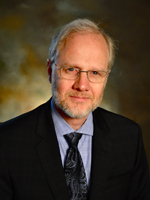
Grant Oliphant has been President of The Heinz Endowments since 2014 and has been a positive force in philanthropy and public service for nearly three decades. A leading proponent of the idea that philanthropy must be vocal in the defense of its values, he has written and lectured extensively on issues of equity, race and social justice, and championed principles that address critical community and societal issues in Pittsburgh and beyond.
Following a six-year term as President of The Pittsburgh Foundation, Grant joined the Endowments where he reshaped the foundation’s grantmaking around three key strategic areas based on the core ethos of a ‘just community,’ supporting commitments and initiatives that enhance the quality of life for all.
Everything I Learned About Being a Good Neighbor During a Crisis I Learned from My Neighbor When I Was in Crisis
By Erin Barnes, CEO and Co-Founder, Ioby
As ioby's CEO and Co-Founder, TFN member Erin Barnes has led ioby's strategic planning, governance, and fundraising for the last 11 years. In addition to her role at ioby, Erin is board chair of Resource Media and an Obama Foundation Fellow.
Recently, Erin shared a personal essay on her own experience dealing with a crisis on Medium. We know so many of our members are dealing with the many fronts of the Covid-19 virus and Erin's message really spoke to us about the big impact small things can have on someone experiencing a crisis or traumatic event.
"Many Americans are already socially isolated, and the physical distancing that we need to do as a society to prevent the spread of coronavirus will exacerbate loneliness, anxiety and despair. In the last 48 hours, I have read a bunch of important pieces about the importance of mutual aid, social solidarity, and social connectedness.
And as I was brainstorming what we as community members, as nonprofit leaders, and as a society ought to do to take care of each other during this crisis, what came to mind for me immediately is what I needed during a personal crisis.
First, a little context. From about 2010 to 2016, as ioby grew and my job became more national, I spent more of my life in everyone else’s neighborhood instead of my own. I became what I thought was more self-reliant, but what was actually socially disconnected. I came to rely on apps for everything that used to just be called favors. A ride home from the airport? I no longer called friends; I used Lyft. Pick up something last minute at the store for me? Nah, I’ll just use Amazon Prime. Walk my dog? A dog-walking service. Help me put together some IKEA furniture? Taskrabbit. Instead of asking for someone to water my plants while I’m out of town, I even built a self-watering irrigation system for my fire escape kale. I convinced myself that I had optimized my life because I didn’t depend on anyone else.
In 2016, just three months after I moved into a new apartment building, my dad was hospitalized after having a seizure and quickly diagnosed with a fast-growing brain cancer. He had surgery to remove the cancer two days before the 2016 election. He died three weeks after Inauguration Day in 2017."
Read the rest of her essay here.
About the Author
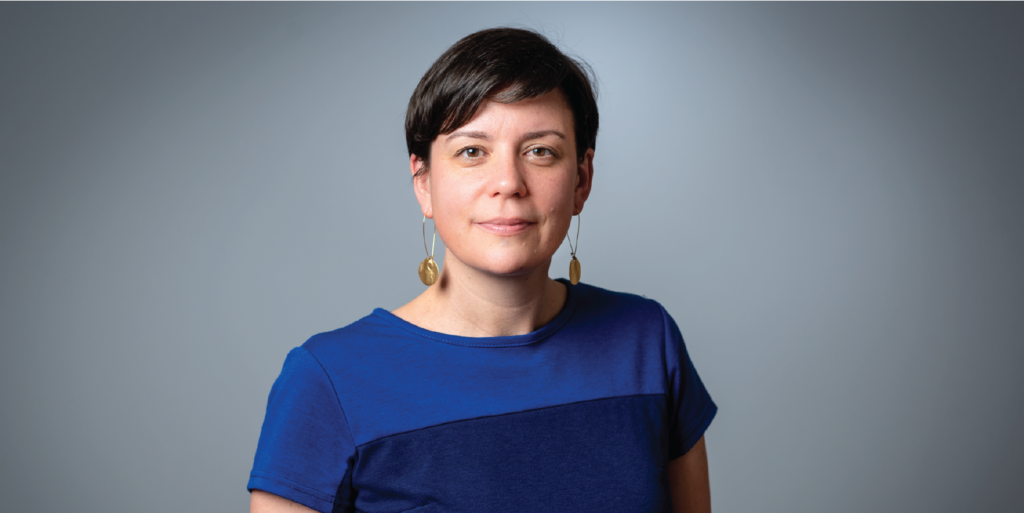
Erin Barnes is CEO and Co-Founder of ioby. She is also the board chair of Resource Media and an Obama Foundation Fellow.
Prior to ioby, Erin was an environmental writer with a background in water management. From 2007-2008, she was the environmental editor at Men’s Journal magazine, and was a freelance writer on climate change and other environmental issues. From 2003-2005, she worked as a community organizer and public information officer at the Save Our Wild Salmon Coalition in Portland, Oregon.
While completing her Master of Environmental Management in water science, economics, and policy at the Yale School of Forestry & Environmental Studies, she was a U.S. Department of Education Foreign Language and Area Studies scholar in Portuguese. She did field research on socio-economic values of water in Goyena, Nicaragua, and the Bolivian and Brazilian Amazon. Her report “Market Values of the Commercial Fishery on the Madeira River: Calculating the Costs of the Santo Antônio and Jirau Dams to Fishermen in Rondônia, Brasil and Pando-Beni, Bolivia” was published in the Tropical Resources Institute Journal in 2007.
Erin also holds a B.A. in English and American Studies from the University of Virginia. Erin lives in Brooklyn and serves as Board chair of Resource Media. The Rockefeller Foundation awarded Erin and her co-founders Brandon Whitney and Cassie Flynn at ioby the 2012 Jane Jacobs Medal for New Technology and Innovation. In April 2018, Erin was selected to join the inaugural class of Obama Fellows, recognized by President and Mrs. Obama for ioby's work in leading the next wave of civic innovation in America.
Resources and Responses from the Philanthropic Sector on Covid-19
By Marci Ovadia, Senior Associate for Equity Programs and Communications
As funders with deep connections to the people and places you support and serve, we recognize that you and your organizations are likely formulating strategies to best support those directly or indirectly impacted by the novel coronavirus, or COVID-19.
We've created a working resource library for funders that we hope will be helpful in navigating the many implications the pandemic will have on the people and places we care about, while keeping the values of equity, inclusion and justice front and center.
While the full health, economic and social impacts of the pandemic are still unkown, it almost certainly have a disproportionate impact on vulnerable communities, including those who rely on hourly wages, gig-economy jobs and others who do not have the privilege of paid sick leave and other employer benefits.
As many of you know, we cancelled our TFN 2020 Annual Conference in San Diego, which was to take place March 16-18 in San Diego. You can read the full statement from TFN President and CEO Pat Smith here, which includes an appeal to funders to be mindful of the important role philanthropy plays in ensuring responses to the coronavirus pandemic align with our values as a sector.

Resources for Funders
Please read, and feel free to share, these resources. We will continue to compile and distribute information via the TFN blog and other platforms.
We wish everyone health and well-being today and in the days ahead.
If you have additional resources to share, please reach out to our Senior Associate for Equity and Communications Marci Ovadia at marci@fundesnetwork.org
Most Recent Updates:
- IssueLab: Philanthropy and COVID-19 in the first half of 2020
- Vox: It’s true: 1 in 1,000 Black Americans have died in the Covid-19 pandemic
- The Atlantic: How to Better Think About Herd Immunity
- LaPlaca Cohen: Culture+ Community in a time of crisis
- Law360: As COVID-19 Safeguards End, Eviction Wave Begins
- Brookings: The Metro Recovery Index: Tracking metropolitan economies through the COVID-19 crisis
Updated 7.13.2020
- Seattle Foundation: Seattle Foundation Shares Knowledge Gained from the Design and Execution of the COVID-19 Response Fund
- Marguerite Casey Foundation: Marguerite Casey Foundation Announces $3.5 Million in COVID-19 Grant Funding to Tackle Racial Disparities Resulting from Pandemic
- Brookings: Race gaps in COVID-19 deaths are even bigger than they appear
- Cleveland Foundation: COVID-19 Rapid Response Fund launches #CLEResponds listening campaign to determine next priority
- Standing Together for a Just and Inclusive California: Philanthropy’s call to address deep racial inequities and invest in our communities
Updated 4.28.2020
- Pew Research Center: Two-thirds of Americans say it is at least somewhat likely the COVID-19 outbreak will disrupt the presidential election
- Federal Reserve of Philadelphia: Which Workers Will Be Most Impacted?
- ABFE (Webinar): Funder Briefing: COVID-19 Relief for Black Businesses
- Stanford Social Innovation Review: Using Scenario Planning to Surface Invisible Risks
- Center for Community Progress: Preventing Post-COVID-19 Vacancy: 6 Interventions Local Governments Should be Thinking About Now
- Inside Philanthropy: First Responders: Philanthropy Battles COVID-19 In The Pacific Northwest
- The Chronicle of Philanthropy: Foundation Leaders Can Prevent an Exodus of Nonprofit Staff
- The Guardian: Halt destruction of nature or suffer even worse pandemics, say world’s top scientists
- Medium: Now Or Never: What is Philanthropy’s Point of No Return?
Updates 4.27.2020
- NPR (Podcast): Aftermath
- NonProfit Quarterly: California Becomes First State to Provide Relief to Undocumented Immigrants
- Pew Research Center: COVID-19 and the country’s trajectory
- The Atlantic: The Pandemic Will Change American Retail Forever
- Urban Institute: The Pandemic’s Disparate Effects on DC Workers and Neighborhoods
- The Field Foundation of Illinois: What Are Chicago Leaders Facing?
- The Atlantic: The Pandemic Shows What Cars Have Done to Cities
Updates 4.24.2020
- Reinvestment Fund: Getting Ready for the PPP
- Pew Research Center: Positive Economic Views Plummet; Support for Government Aid Crosses Party Lines
- CityLab: The Coronavirus Pandemic Makes a Case for Megaregions
- The Root: The 'Open America' Protests Are a Classic Example of the Power of White Privilege
- CityLab: For Cities, This Is a Fiscal Disaster
- Azure: Urban Density: Confronting the Distance Between Desire and Disparity
- New York Times: World Leaders Launch WHO Covid Response Plan, US Not Involved
- Community Foundation of the Ozarks: CFO announces seven new COVID-19 grants, first technology grant
- Urban Institute: Essential Construction Work during the Pandemic Needs to Prioritize Worker Safety
- GRIST: Coronavirus is not just a health crisis — it’s an environmental justice crisis
- Center for Community Investment: Reimagining Strategy in Context of the COVID-19 Crisis: A Triage Tool
- LA Times: Charity is off the charts amid the coronavirus. Is that a sign of America’s strength or weakness?
Updates 4.23.2020
- Transportation Response Center: NACTO Resources for COVID-19
- Greater Ohio Policy Center: How Ohio's Legacy Cities Are Responding To COVID-19
- Community Foundations Public Awareness Initiative: Community Foundations Nationwide Launch Coronavirus Relief Efforts
- GRIST: How do you collect climate data during a pandemic? Strap on your skis
- Build Healthy Places Network (Webinar): Why Investing in Communities Matters More than Ever in the Time of Coronavirus
- CityLab: We Can’t Wait Until Coronavirus Is Over to Address Racial Disparities
- Fuse Corps: During the COVID-19 Crisis, Staying Connected to Communities Is More Critical than Ever. Here’s How to Do It Right.
- LISC: LISC Announces Second Round of Small Business Relief Grants
- SPARCC: Laying the Groundwork for an Equitable and Just Recovery
Updates 4.22.2020
- Detroit Free Press: Nonprofits employ nearly 500K Michiganders. They need SBA Payroll Protection Program funds
- The New Yorker: The Black Plague: Public officials lament the way that the coronavirus is engulfing black communities. The question is, what are they prepared to do about it?
- Politico: Coronavirus underscores need to address environmental inequities, report says
- The Chronicle of Philanthropy: Nonprofit Crisis Management: A Checklist
- The Heinz Endowments (Podcast): Stronger Than This: A special podcast of candid Covid-19 conversations hosted by Grant Oliphant
- Brookings: Coronavirus economic relief cannot neglect Black-owned business
- The Chronicle of Philanthropy: Philanthropy Can Do a Lot to Help Hard-Hit Small Businesses and Nonprofits
- The NonProfit Times: Prepare Now to Rebuild Your Programs
- YWCA: Stand Against Racism: National Tele-Town Hall
- Scientific American: Trust Is The Key to Fighting the Pandemic
- NPR: Navajo Families Without Internet Struggle To Home-School During COVID-19 Pandemic
Updates 4.21.2020
- Race Forward: Statement on Disproportionate COVID-19 Cases and Deaths in Black and Latinx Communities: It’s Time to Lead with Racial Equity
- New Mexico Community Foundation: Native American Relief Fund
- Every Level Leadership: Resilience, Equity and Empathy (while Zoom-ing)
- Grantmakers Concerned With Immigrants and Refugees: GCIR and Philanthropic Partners Announce Creation of California Immigrant Resilience Fund
- TIME: The Coronavirus Is a Wake-Up Call for Racial Inequality. It’s Time to Change the System
- MIC: Migrant farm workers might see a pay cut even though they're "essential"
Updates 4.17.2020
- COVID-19 Relief and Recovery: Guiding Principles to Secure Our Water Future Letter
- Open Society Foundations: Our Emergency Response to COVID-19
- Fuse Corps: What Government Agencies Can Do Now to Help Small Businesses Cope with the COVID-19 Crisis
- Inside Climate News: Covid-19 and Climate Change Threats Compound in Minority Communities
- The Guardian: Polluted US areas are among worst-hit by coronavirus – putting people of color even more at risk
- Planetizen: Watch: The Future of Cities After COVID-19
- The Aspen Institute: Job Quality in Practice Webinar: Worker Organizations Respond to the COVID-19 Crisis
Updates 4.16.2020
- Armanino: Digging Deeper into CARES & SBA Disaster Loans
- HuffPost: The Economic Devastation Of COVID-19 Is Hitting Women Particularly Hard
- TIME: Domestic Workers Take Care of Us. Now, It's Time For Us to Take Care of Them
- National Center for Family Philanthropy: A Clarion Call for Family Philanthropy
- Vox: Coronavirus is causing a mental health crisis. Here’s how to fight it.
- The Chronicle of Philanthropy: Nonprofit Finances Hit on Several Fronts
- Forbes: Gender Justice Funders Address Impact Of COVID-19 On Women And Girls
- Medium: Disrupting Status Quo in COVID-19 Rapid Response
- New York Community Trust: NYC COVID-19 Response & Impact Fund
- AJL Foundation: Unmasking Opportunity Amid the COVID-19 Pandemic: The Knotty Tie Co. Program Related Investment
- Yes! Solutions Journalism: Coronavirus and Climate Change: How to Save Lives During Crises
- Yes! Solutions Journalism: Who Will Bear the Economic Burden of COVID-19?
- Council on Foundations: A Call to Action: Philanthropy's Commitment During COVID-19
- The Hill: COVID-19 pandemic exposing America's water infrastructure crisis
- Thomson Reuters Foundation: Post virus, let's rebuild climate-smart, healthier and equitably
- Philanthropy News Digest: Gates Foundation Commits Additional $150 Million to COVID-19 Response
Updates 4.15.2020
- Philanthropy Massachusetts (Webinar):
Supporting Immigrant Communities in the Context of COVID-19: Funders Connect - Wallace Global Fund: Wallace Global Fund Pledges to Spend 20 Percent of Assets in 2020
- Amalgamated Foundation: Families and Workers Fund - Helping the workers, families, and communities most devastated by the Covid-19 virus
- Federal Reserve Bank of St. Louis: Covid-19 Resources
- Next Cities: How COVID-19 Is Changing Cities’ Approach to Homelessness
- Toronto Foundation: Better Toronto Coalition Hub
- CityLab: How We Stopped Villainizing the Social Safety Net
- Ford Foundation: A Note from Home
- Neighborhood Funders Group: Covid-19 Strike Wave
- Latino Community Foundation: Love Not Fear Fund (Covid-19)
- Smart Growth America: Complete Streets + Covid 19
- The Chronicle of Philanthropy: In This Crisis, Philanthropy Must Tackle 3 Existential Challenges All at Once
- LAist: California Announces $125 Million For Undocumented Workers In Coronavirus Assistance
Updates 4.14.2020
- Urban Institute: Responding to the COVID-19 Crisis: Making Direct Cash Payments Work
- CNN Podcasts: The Crisis in Our Prisions: Cornoavirus - Fact vs. Fiction
- The Chronicle of Philanthropy: Rapid-Response Grant Opportunities for Pandemic Crisis
- Brookings: COVID-19’s essential workers deserve hazard pay. Here’s why—and how it should work
- Community Foundations of Canada (Webinar): Stewarding donors during turbulent times
- The New York Times: The Coronavirus Class Divide: Space and Privacy
- National Committee for Responsive Philanthropy: How can funders & donors respond to COVID-19 in an equitable and effective way?
- National Committee for Responsive Philanthropy (Webinar): Supporting Immigrants During the COVID-19 Crisis
Updates 4.13.2020
- Bloomberg Cities: 5 actions cities can take now to maximize federal disaster aid
- Philanthropy Massachusetts: Funding for Domestic Violence Shelters
- NonProfit Quarterly: Anatomy of a Rollout Disaster: The Paycheck Protection Program
- Arabella Advisors: How Impact Investors Can Respond to COVID-19
- Giving Compass: Native American Community Response Fund
- Center for Disaster Philanthropy (Webinar): COVID-19: Making Effective Rapid Response Grants
- CityLab: As Coronavirus Quiets Streets, Some Cities Speed Road and Transit Fixes
- The Pittsburgh Foundation: Daily Webinar series for nonprofits navigating COVID-19
- The Center for Effective Philanthropy: Fulfilling Philanthropy’s COVID-19 Pledge: Listening in a Time of Crisis
- The Communications Network (Webinar): COVID-19 Q&A with Infectious Disease Expert Dr. Richard Wenzel
- United Philanthropy Forum: Digging Deeper in Times of Crisis
- NonProfit AF: This is the wake-up call for nonprofits and foundations to get political
- Frameworks Institute: Nonprofits are essential — especially now
Updates 4.10.2020
- Fairfield County's Community Foundation: Our Covid-19 response
- Shelterforce: Housing Policy Must Change in Wake of COVID-19
- YWCA: COVID-19 Emergency Relief and Community Resiliency Fund
- Inside Climate News: Decades of Science Denial Related to Climate Change Has Led to Denial of the Coronavirus Pandemic
- The Chronicle of Philanthropy: Foundations and Corporate Funds Announce New Wave of Covid-19 Grants (Coronavirus Grants Roundup)
- The New York Times: On America's Busiest Highways, the Virus Leaves an Open Road
- Candid: Candid resources to advance your work during the coronavirus crisis
- NUMO Alliance (Webinar): Resilience & Transportation: Lessons from Latin America's Response to COVID-19
- NPR: Coronavirus State-By-State Projections: When Will Each State Peak?
- Artist Relief: Artists Relief Invites Applications From Artists Facing COVID-Related Emergencies
- NonProfit Quarterly: CARES Act: New Nonprofit Provisions Pushed for Next Round of Relief Money
- Amplifier: COVID-19 Resources for Generosity, Intention, and Togetherness
- Sustainable Cleveland: Tips to Help Reduce Waste During COVID-19
- Medium: Creative philanthropy as a means for offering stability, blessing, and hope
- NDN Collective: NDN Collective Announces $10 Million COVID-19 Response Project for Indigenous People
- Childcare Aware of America (Webinar): A Funder's Perspective on Child Care Response and Recovery During and After COVID-19
- Upworthy: A trauma specialist's open letter outlines some essential truths about our lives right now
- Brookings: Why are Blacks dying at higher rates from COVID-19?
Updates 4.9.2020
- Funders Network Collaborative on Mobility and Access: Video briefing for foundations on transportation access and mobility during the crisis
- The Chronicle of Philanthropy: Foundations and Nonprofits See Crisis as Opportunity to Advance Equity
- Community Foundation for Greater Atlanta: Dealing with xenophobia and racism spurred by COVID-19
- Urban Institute: Three Ways Policymakers Can Support Apprenticeships during the Pandemic
- Philanthropy News Digest: Corporate Funders Support COVID-19 Relief
- CityLab: The Post-Pandemic Urban Future Is Already Here
- The Chronicle of Philanthropy: Now Is The Time To Invest In Fundraising
- Metropolitan Housing Counsel (Webinar): Keeping Chicago Renters Housed in a Time of Crisis
- Philanthropy News Digest: Brooklyn Community Foundation Accepting Applications for Brooklyn COVID-19 Response Fund
- Connect for Health Colorado: We’ve got you covered during this COVID-19 outbreak
- The Detroit News: Digital access is the new frontier in K-12 equity
- Brookings Institute: Critical in a public health crisis, COVID-19 has hit local newsrooms hard
- The New York Times: New Research Links Air Pollution to Higher Coronavirus Death Rates
Updates 4.8.2020
- The Chronicle of Philanthropy: Why All Foundations Should Support the Guardians of the Nonprofit World Now
- Grist: Remote Possibilities — Coronavirus has shocked businesses into low-carbon practices. Will they stick?
- NPR (Podcast): Women Are Losing More Jobs In Coronavirus Shutdowns
- Earth Institute (Webinar): After the Pandemic: Health Care In Crisis
- Metropolitan Planning Council: Only 11% can afford to protect themselves
- An Open Letter to Philanthropy: The Cure to Viral Racism is Within Our Hands
- William Penn Foundation: William Penn Foundation continues commitment to arts and culture with $11.8 million in new grants to 35 organizations
Updates 4.7.2020
- National Center for Family Philanthropy (Webinar): Beyond 5%: Increasing Support in a Time of Crisis
- The Funders' Network (Webinar): Bridge the Divide: Economic Democracy & Sharing Power
- The Conversation: Coronavirus is not the ‘great equalizer’ — race matters
- Trust-based Philanthropy Project: Resources— Pull up a chair and get started
- Transit Center: Statement on Redistributing MTA Service to Prevent Harm to Black and Brown New Yorkers
- NPR: 'It's Madness.' Wisconsin's Election Amid Coronavirus Sparks Anger
- Next Avenue: COVID-19 and Aging: What Can Philanthropy Do?
- Youthprise: RFP for our COVID-19 Emergency Response Fund is Now Open
- Forum for Community Solutions (Webinar): Justice Out Loud: These Times Call For Nothing Less
- Gates Foundation: A Covid-19 Vaccine Will Need Equitable, Global Distribution
- The Chronicle of Philanthropy (Webinar): The Stimulus Bill and Nonprofits: Answers to Your Questions
- Robert Wood Johnson Foundation: Robert Wood Johnson Foundation Provides $50 Million to Support Those Facing Greatest Strain Under the COVID-19 Pandemic
- African American Mayors Association: AAMA/Civil Rights Orgs Ask for Release of Disaggregated COVID19 Data
- NonProfit Quarterly: Nonprofits and Funders: Coronavirus Requires Immediate State Advocacy
- Fenton: Spread Facts, Not Germs: Social Media Toolkit for Credible Messaging Around COVID-19
- Rockefeller Foundation: Effective Public Health Communication in an Interconnected World: Enhancing Resilience to Health Crises
Updates 4.6.2020
- Knight Foundation: Resources for navigating the CARES Act
- Pew Research Center: Cable TV and COVID-19: How Americans perceive the outbreak and view media coverage differ by main news source
- The Center for Effective Philanthropy (Webinar): Leadership in Crisis: Insights for Philanthropic and Nonprofit Leaders
- CityLab: A Green Stimulus Plan for a Post-Coronavirus Economy
- US Water Alliance: COVID-19 Relief and Recovery: Guiding Principles to Secure Our Water Future
- The Heinz Endowment: The Rescue We Seek
- SLATE: Essential workers are dying—America's underclass is becoming more visible in the coronavirus crisis
- National Council for NonProfits: Federal COVID-19 Legislation: What do they mean for nonprofits?
- The Communications Network (Webinar): COVID-19 Virtual Roundtable: Promoting Productive Action — Lessons from the CDC’s Crisis Comms Handbook
- Urban Institute: To Support Vulnerable Communities, Foundations and Donors Should Consider Impact Investments
- NonProfit Quarterly: Voices from the Field: Tangible, Timely Tactics for Nonprofits during Crises
- Pew Research Center: The state of Americans’ trust in each other amid the COVID-19 pandemic
Updates 4.3.2020
- Vox: America’s housing system was radically unprepared for coronavirus
- Brookings: From Rural Digital Divides to Local Solutions
- Rolling Stone: New Map Shows COVID-19 Is Hitting People of Color Hardest
- National Association of City Transportation Officials: COVID-19 Transportation Response Center
- Trust Based Philanthropy Project: Webinar: Trust-Based is Trending During Covid-19. What Will It Take To Sustain It?
- The Skillman Foundation: COVID-19 Response Fund Partner Profile - Alternatives For Girls
- Edmonton Community Foundation: Donate to COVID‑19 Pandemic Response (Canada)
- Pew Research Center: Coronavirus Disease 2019 (COVID-19) Resource Library
- Yes! Magazine: Parenting During Coronavirus: Opportunities to Reconnect and Decolonize
- The New York Times: The Racial Time Bomb in the Covid-19 Crisis
- Yes! Magazine: Community Care: An Indigenous Response to Coronavirus
- The Brookings Cafeteria (Podcast): How cities and states are responding to COVID-19
- Urban Institute (Podcast): How Will the Coronavirus Spending Bill Provide Support During the Pandemic?
- NonProfit Quarterly: This Is Not a Test: Philanthropy and Nonprofits in the 2020 Economic Shutdown
- National Center for Family Philanthropy: Leadership in Difficult Times: Guidance for Donor and Giving Families
- Disability Rights Fund:Our Response to the COVID-19 Concerns
- The Center for Effective Philanthropy: Rapid Grantee Feedback in a Challenging Time
- Lilly Family School of Philanthropy: Volunteering during COVID-19
—Is it safe?
Updates 4.2.2020
- Hemenway & Barnes: An overview of the CARES Act and Nonprofits
- Independent Sector: CARES Act: How to Apply for Nonprofit Relief Funds
- The Chronicle of Philanthropy: 9 Leading Nonprofit Groups Urge Foundations to Dig Into Endowments to Support Charities
- US News: Why We Can't Ignore the Link Between COVID-19, Climate Change and Inequity
- Inside Philanthropy: Virus-Proofing the Vote: Democracy Funders Respond to COVID-19
- Open Democracy: Four ways you can take caring action around coronavirus – even if you’re overwhelmed
- The New York Times: The Safety Net Got a Quick Patch. What Happens After the Coronavirus?
Updates 4.1.2020
- Vox: Our environmental practices make pandemics like the coronavirus more likely
- CityLab: The NIMBYs of the Corona Crisis - Why would residents block a covid-19 testing site? For the same reason many oppose other forms of neighborhood change: a desire to shift the burden elsewhere
- Brookings: Federal fiscal aid to cities and states must be massive and immediate
- NonProfit Quarterly: In Times of Crisis, Watch Closely—or Your Rights May Disappear
- The Chronicle of Philanthropy: Leaders Argue That Nonprofits Need Government Aid
- The Center for Effective Philanthropy: Targeting Support to Organizations Most in Need
- NPR: Underlying Health Disparities Could Mean Coronavirus Hits Some Communities Harder
- Asian Americans/Pacific Islanders in Philanthropy: AAPIP Statement on COVID-19 can be found here.
- Vox: The coronavirus is exacerbating vulnerabilities Native communities already face
- Smart Growth America: Smart Growth America is releasing a package of infrastructure and community development recommendations to inform additional short-term emergency measures and longer-term economic recovery efforts—with an eye toward bringing benefits to the most people in an equitable way. You can also join their webinar on Wednesday, April 15 at 1pm ET where they will walk through their recommendations for supporting the nation through a recovery plan.
- The Root: Black Communities Are on the 'Frontline' of the COVID-19 Pandemic. Here's Why
- Center for Effective Philanthropy: CEP’s rapid-response grantee feedback tool is designed to help you gather a comprehensive picture of what your grantees are experiencing during the ever-changing context of the COVID-19 pandemic and consequent economic challenges.
Updates 3.31.2020
- Council on Foundations: Policy Briefing— How the $2 Trillion COVID-19 Economic Stimulus Bill Impacts Philanthropy
- Glasspockets: Coronavirus Heightens Importance of Being a Transparent and Flexible Foundation
- Thomson Reuters Foundation: COVID-19: We're here to help
- NonProfit Quarterly: COVID-19 — Using a Racial Justice Lens Now to Transform Our Future
- The Business of Giving: Dan Cardinali, CEO of the Independent Sector, Cites Collective Action Victories for Nonprofits during COVID-19 Crisis
- Bloomberg Philanthropies: Bloomberg Philanthropies and NACTO Launch Online Hub for Transportation Officials Responding to COVID-19 Emergency
- SLATE: How Racial Health Disparities Will Play Out in the Pandemic
- National Alliance to End Homelessness: Estimated Emergency and Observational/Quarantine Bed Need for the US Homeless Population Related to COVID-19 Exposure by County; Projected Hospitalizations, Intensive Care Units and Mortality
- HuffPost: What It’s Like To Not Have Running Water During A Pandemic
- People's Hub: (Webinar) No Going Back —The COVID-19 Policies We Need to Transform This System for Good
- Health and Environmental Funders Network: Resilience: Living Beyond Fear with the Coronavirus
- The Chronicle of Philanthropy: Philanthropy Should Support Frontline Workers During Pandemic and Beyond
- The Chronicle of Philanthropy: The COVID-Altered “Market” Deepens Crisis for Local News
- Medium: Philanthropy, this is our “Matrix” moment . . . what will you choose?
- The Sacramento Bee: Immigrants face coronavirus in ‘death trap’ detention centers. California must act
Updates 3.30.2020
- National Center for Family Philanthropy: Interactive Map of COVID-19 Response and Recovery Funds
- The Philadelphia Tribune: Philly foundations launch $6.5M COVID-19 emergency fund for local nonprofits
- Living Cities: Ideas and Resources for How Cities Can Attack the COVID-19 Crisis
- NAACP: Ten Equity Implications of the Covid-19 Outbreak in the United States
- The Washington Post: Moderate social distancing yields $8 trillion in economic benefits, study finds
- Smart Growth California: Covid-19 and California
- Daily News: Our viral awakening: What coronavirus taught me and what it should teach America
- ComNet: (Webinar) Part 2 | COVID-19 Q&A with Dr. Richard Wenzel
- YES! Magazine: We Need to Talk About Privilege and the Coronavirus Pandemic
- National Endowment for the Arts: Books that can bring the world to us as we shelter in place
- William Penn Foundation: Emergency Fund for Philadelphia Childcare Providers Impacted by COVID-19
- The Chronicle of Philanthropy: Financing During a Pandemic: How to Adapt to a Crisis
- The Chronicle of Philanthropy: Event Cancellations: What You Need to Know
- Good Jobs Institute: COVID-19 Worker Relief Funds, Company Actions, and Impact on Frontline Workers
- LISC: Local Funding Opportunities during COVID-19
- NPR: Lost Work Because Of Coronavirus? How To Get Unemployment, Skip Loan Payments And More
Updates 3.18.2020
- Ioby: Everything I Learned About Being a Good Neighbor During a Crisis I Learned from My Neighbor When I Was in Crisis
- Philanthropy Network of Greater Philadelphia: A Call for Unprecedented Unity in Unprecedented Times
- Latino Community Foundation: Responding to the Moment: How Philanthropy can Support Latino Nonprofits
- Advancement Project: Civil Rights and Racial Justice Organizations Denounce Discrimination Against Asian Americans and Urge Unity in Responding to Coronavirus Pandemic
- The New York Times: The Coronavirus Exposes Education’s Digital Divide
- Nonprofit Quarterly: COVID-19 Reminds Us No Nonprofit Is an Island
- Restaurant Workers Community Foundation: RWCF COVID-19 Emergency Relief Fund
Updates 3.17.2020
- Inside Philanthropy: Philanthropy Has a Duty to Respond Quickly to the COVID-19 Outbreak. Here’s How We Can Do It — Inside Philanthropy
- Center for Disease Control: Guidance on Large Gatherings
- Medium: Covid-19— what Philanthropy Can Do
- NonProfit Quarterly: An Appeal to Congress to Include Nonprofits in Packages for Relief and Stimulus
- World Health Organization: Social stigma associated with Covid-19—a guide to preventing and addressing social stigma
- The Chronicle of Philanthropy: Experts Urge Charities to Communicate Their Needs Clearly to Their Donors
- The Chronicle of Philanthropy: Special Report - Help for Nonprofits During the Coronavirus and Uncertain Economic Times
- Brookings: As coronavirus fuels a looming recession, which cities achieved inclusive growth in the past decade's boom?
- Brookings: Protecting our most economically vulnerable neighbors during the COVID-19 outbreak
- The Heinz Endowments: The Ultimate “Yes, And”
- Legal Defense Fund: LDF Calls on the U.S. Senate to Pass the Families First Coronavirus Response Act
Updates 3.16.2020
- Blackbaud: Covid-19 Event and Fundraising Resources During Possible Impact
- The Communications Network: Coronavirus Crisis Communications Triage Kit
- Ioby: Working during COVID-19: How to get your distributed team to BURST with culture
- Washington Post: Simulator | Why outbreaks like coronavirus spread exponentially and how to "flatten the curve"
- CNN: Here's a complete list of every state health department's coronavirus website
- The New York Times: Avoiding Coronavirus May Be a Luxury Some Workers Can’t Afford
- The New York Times: As Coronavirus Deepens Inequality, Inequality Worsens Its Spread
- California Endowment: Lead By Shutting It Down - Notes on COVID-19
- The Center for Effective Philanthropy: Supporting Our Unsung Heroes in a Moment of Crisis: Part 1
- The Chronicle of Philanthropy: As Disasters Go, Coronavirus Impact on Philanthropy Unprecedented
- Brookings: Coronavirus makes it impossible to ignore the economic insecurity build into our labor market
- Urban Institute: Feeding the Country during a Pandemic: Seven Ways Forward
- The NonProfit Times (webinar): COVID-19 & Nonprofit Response: Health, Fundraising, and Risk Assessment
- Southern California Grantmakers: How Philanthropy Can Support and Enhance the Government Response to Covid-19
Updates 3.13.2020
- Grantmakers in the Arts is sharing resources and guidance on Covid-19 virus
- Grantmakers in the Arts: Are Cultural Organizations Recession-Ready?
- National Committee for Responsive Philanthropy: Coronavirus, boom and bust election funding, and an impending recession
- The Communications Network (Webinar): Infectious Disease Expert on What to Know and How to Communicate about COVID-19. Register here.
- Open Society Foundations: Health, Strength, and Courage | A message from President Patrick Gaspard on Covid-19
- Candid: Philanthropy's response to the novel coronavirus (COVID-19). (Updated regularly)
- Candid: Update on the philanthropic response to the Coronavirus Disease (COVID-19)
- YES! Solutions Journalism: What You Can Do About COVID-19 Right Now
- YES! Solutions Journalism: Facing COVID-19 With Community Instead of Fear
- The Chronicle of Philanthropy: How to Help the Most Vulnerable Through the Pandemic
- The Chronicle of Philanthropy: Responding to the Coronavirus Outbreak: Resources to Help Nonprofits
- World Health Organization: The WHO has launched a global fundraising effort to support the fight against coronavirus. Learn more here.
- Ford Foundation: A Message of Support for Our Grantees
Updates 3.12.2020
- Capital and Main: Coronavirus Is Hitting Low-Wage Earners Especially Hard
- Webinar from Healing Justice: Coronavirus: Wisdom from a Social Justice Lens
- Heising-Simons Foundation: To provide relief to grantee partners, the Foundation is offering a rapid response fund to offset unexpected costs incurred for disruptions to operations as a result of the coronavirus outbreak. Click here for more information.
- Race Forward: Statement on the Coronavirus emergency, official response and its impacts on communities of color can be found here.
- Elemental: Separating the Facts From the Misinformation About COVID-19
- Washington Post: How to close schools without hurting vulnerable students
Asian Americans/Pacific Islanders in Philanthropy
AAPIP Statement on COVID-19 can be found here.
The California Endowment
- Bilingual one pagers and posters on COVID-19: Get the Facts: Novel Coronavirus 19 Resources for Partners
Center for Disaster Philanthropy Resources and Information
- Center for Disaster Philanthropy has an overview of the entire COVID-19 situation here which they are updating daily with key events here.
- CDP has a critical needs list for how organizations wanting to respond can proceed. “As this disease continues to spread across the world and emerge in new countries, the number of responding organizations continues to grow as well. "
CDP also has this call to action on how to help: “Center for Disaster Philanthropy (CDP) has a COVID-19 Response Fund that provides an opportunity for donors to meet the ongoing and ever-expanding challenges presented by this virus.
- Webinar recording: COVID-19 Coronavirus: How Philanthropy Can Respond
- Webinar recording: Complex Humanitarian Emergencies: Philanthropy’s Role in Recovery
CDP has also created a list of suggestions for foundations to consider related to disaster giving here with guidance on basic tips for disaster giving.
Centers for Disease Control and Prevention
- Info on pandemics: Pandemics and Infectious Diseases
Council on Foundations
- Resources for funders on COVID-19.
- Here is their list of Day-to day update resources on the outbreak:
- COF's further reading and resources for funders:
Bill and Melinda Gates Foundation
- Foundation homepage for all COVID-10 announcements here.
- Blog: How To Respond to COVID-19 and Prepare For the Next Epidemic, Too.
- Blog: How new technology could reveal a treatment for COVID-19
Immune Deficiency Foundation
- CEO statement on COVID-19 here.
Northern California Granmakers
Webinar: How Philanthropy Can Support and Enhance the Government Response to COVID-19 (March 12 at 9 a.m. PT)
Minnesota Council on Foundations
Webinar recording: Needs for a COOP and a COVID-19 plan specifically.
Seattle Foundation
US Chamber of Commerce Foundation:
- List of pledged money and aid from companies to the philanthropic sector.
- Article from US Chamber Foundation’s blog: Billion Dollar Problem: Working Parents Leave Workforce, Postpone School Due to Childcare Challenges
Robert Wood Johnson Foundation
Richard E. Besser, a physician and president and chief executive of the Robert Wood Johnson Foundation, penned this Op-Ed on how as coronavirus spreads, the bill for our public health failures is due can be found here.
Washington NonProfits
- Action Alert: How Novel Coronavirus (COVID-19) May Impact Nonprofits
- Planning a response for the Coronavirus—a guide for businesses and organizations.
- Webinars: Planning on for dealing with coronavirus in regards to alternat
World Health Organization
- Report: Getting Your Workplace Ready for COVID-19
- Article: Shortage of personal protective equipment endangering health workers worldwide
News Stories:
- VICE: Coronavirus Will Hit American Hourly Workers Extra Hard
- The Atlantic: What Could Happen if the Coronavirus Closed Schools for Days, Weeks, or Even Months
- The Atlantic: The Coronavirus Recession Will Be Unusually Difficult to Fight
- New York Times: Live Updates on Coronavirus—Governments Clamp Down But Virus Still Spreads
- TIME Magazine: 'If We Don't Work, We Don't Get Paid.' How the Coronavirus Is Exposing Inequality Among America's Workers
- CNBC: Coronavirus highlights the inequality of who can — and can’t — work from home
- Marketplace: Debt, inequality and the coronavirus: A conversation with former Fed Chair Janet Yellen and the World Bank’s David Malpass
- The Guardian: Coronavirus quarantine and self-isolation: your questions answered
- The CT Mirror: Coronavirus feeds on U.S. inequality
- Chronicle of Philanthropy: Nonprofit Conference Attendees Worry About Coronavirus
- NonProfit AF: A few things for nonprofits and foundations to consider in light of the Coronavirus
- The Wall Street Journal: Uber, DoorDash and Others Discuss Fund for Drivers Affected by Coronavirus
Meet Our 2020 PLACES Fellows!
By Marci Ovadia, Senior Program Associate, Equity Programs and Communications
TFN is proud to announce our 2020 PLACES Fellows— 16 exemplary leaders in philanthropy who will embark on a year-long curriculum focusing on race, equity and inclusion.
A key element of TFN’s mission is to ensure these important values are reflected in the work we do — and ensuring that we support those working in philanthropy with the tools they need to turn ideals into outcomes.
As we grapple with the real-life consequences of structural racism and other inequities, it's hard to understate the important role philanthropy can play in these contentious times.
PLACES, whose alumni now number more than 140 individuals from the U.S. and Canada is designed to help professionals in philanthropy embed an equity lens into the work they do. Recent cohorts have addressed issues impacting disenfranchised communities, including structural racism, gender justice, health equity, environmental sustainability, economic development and community engagement — asking difficult questions, exploring uncomfortable truths and confronting their own biases along the way. To learn more about the PLACES fellowship and the impact it has had on alumni, we invite you to check out Going PLACES, our equity focused blog series chronicling our past fellows experiences throughout their PLACES year in their own words.
For more information about the new fellows, past alumni, and the PLACES fellowship itself, click here.
Many of our PLACES fellows and alumni will be at our TFN 2020 Annual Conference in San Diego March 16-18. Feel free to ask them about their PLACES experience, and don't hesitate to reach out to me directly if you'd like to know more about this extraordinary fellowship.
Join us in congratulating the 2020 PLACES Cohort, and we look forward to seeing you in San Diego!
Sincerely,
Dion Cartwright, Marci Ovadia, and Bina M. Patel
The PLACES Team
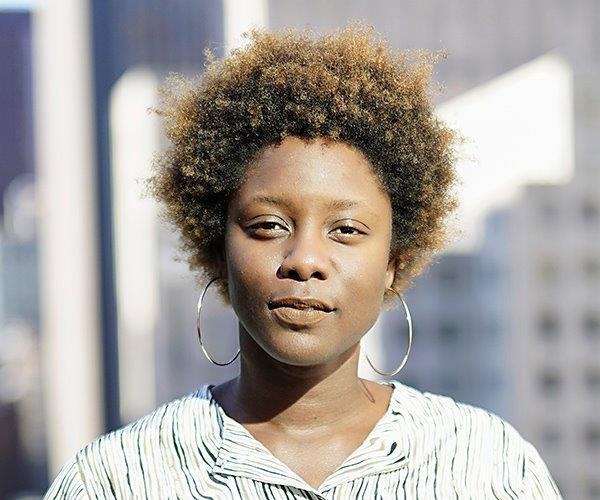
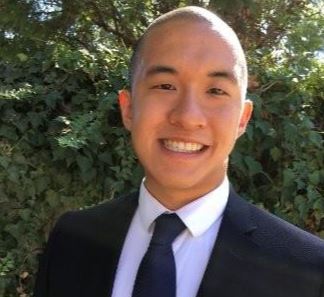
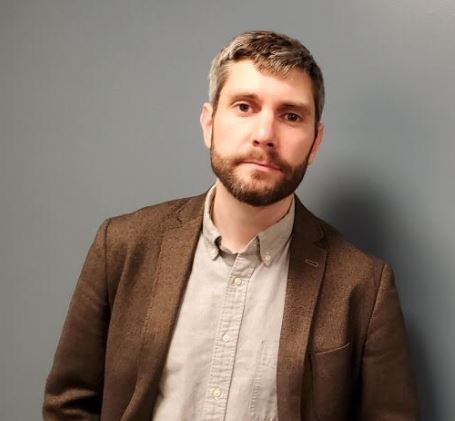

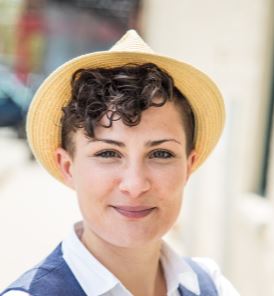
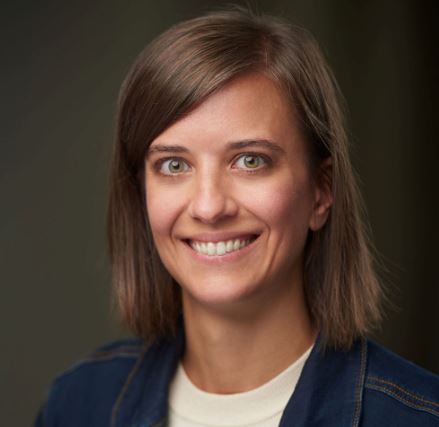

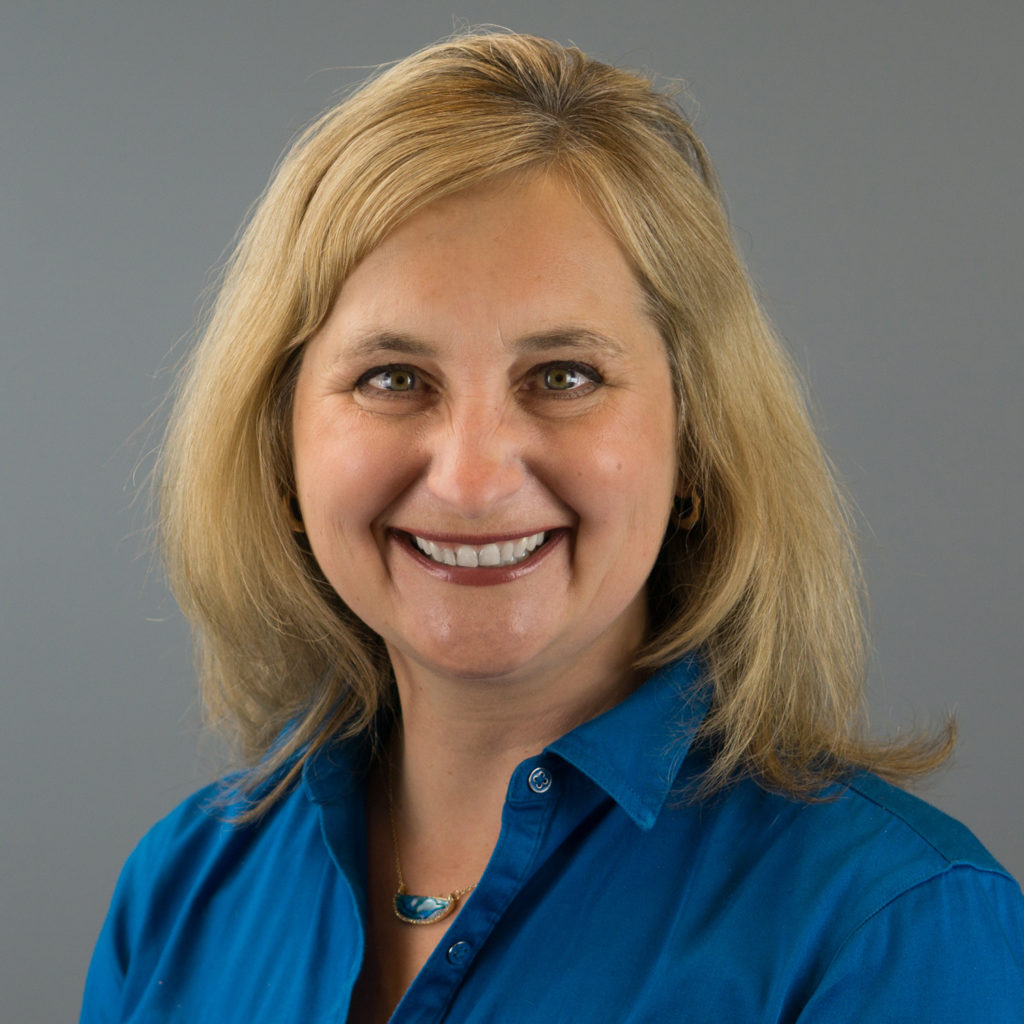
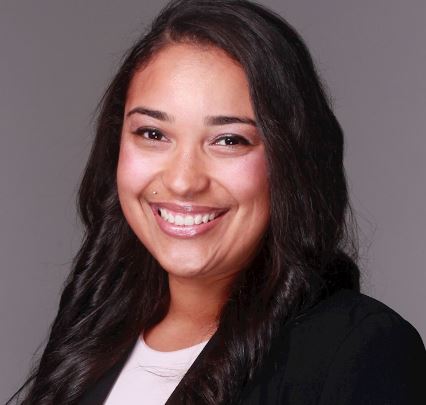
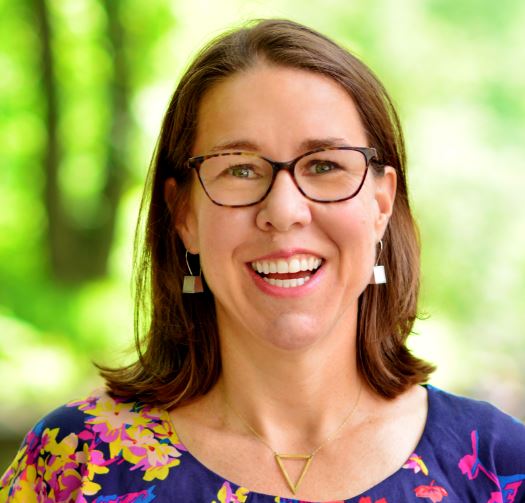
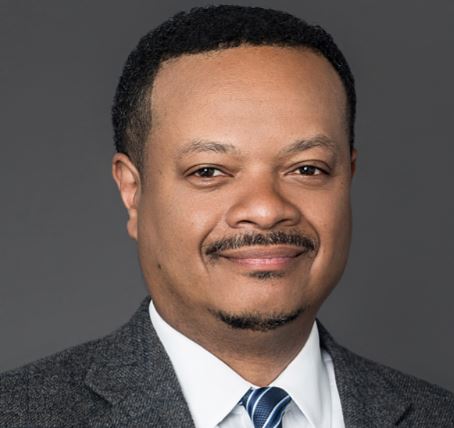
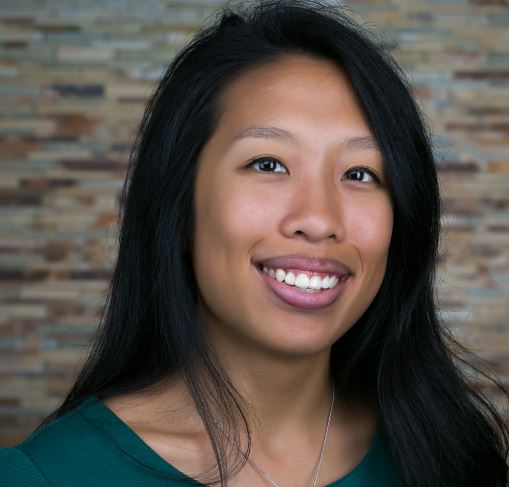
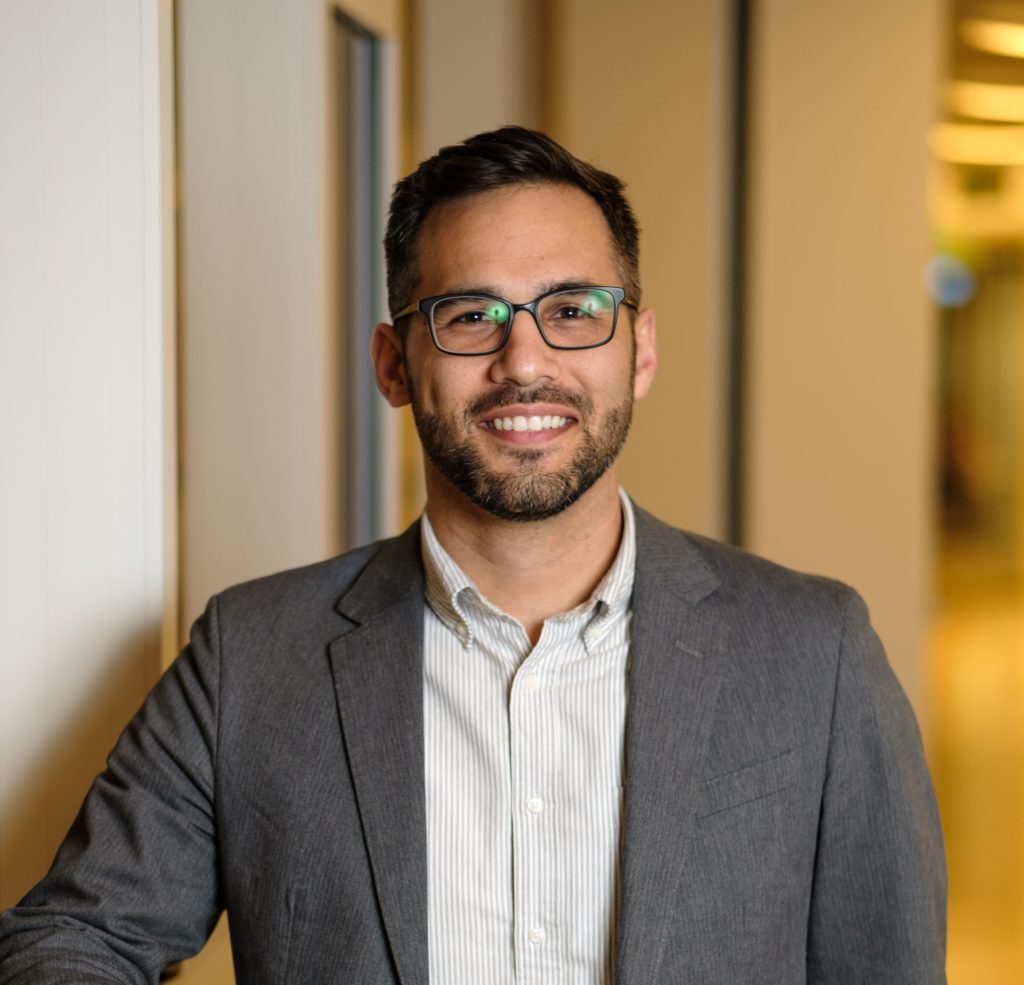

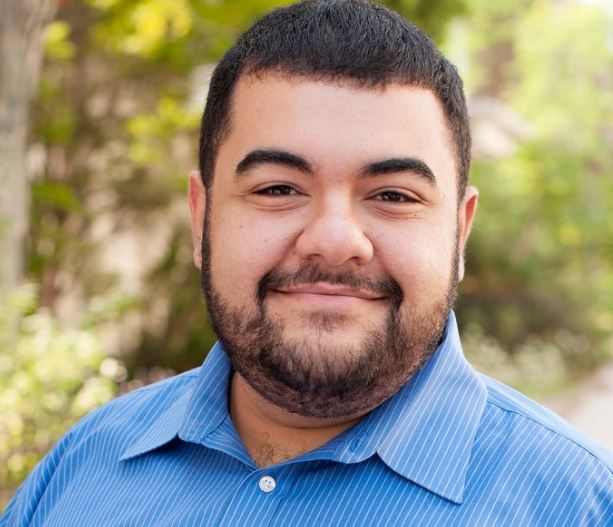

Going PLACES: What Are You Giving To Communities As A Healer?
By Gabrielle Sims, Project Associate, Shah Family Foundation
Going PLACES is an occasional blog series featuring the voices and experiences of TFN’s PLACES Fellows. For more information on the fellowship, and to read past blog posts from our fellows, visit here.
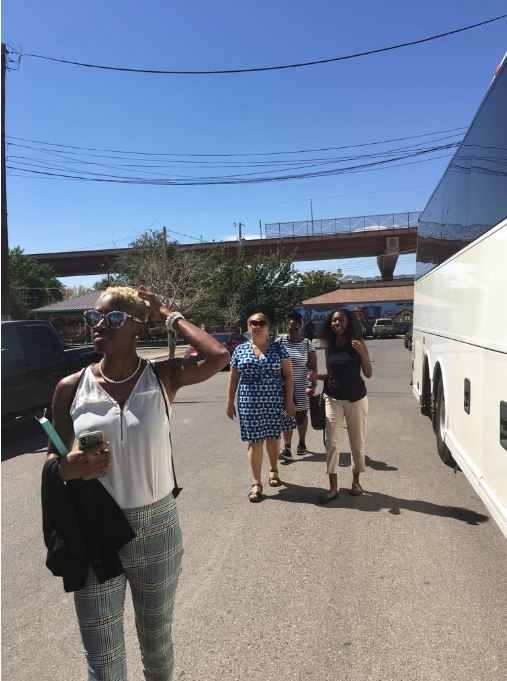
El Paso was the city that I was most excited to visit over the course of my PLACES journey. Before the visit, I only knew two things about El Paso: that it had a rich and vibrant culture and that it was the epicenter of the immigration debates garnering national attention due to President Trump's policies and rhetoric. My state of mind was that this was going to be a trip that was emotionally and intellectually heavy but that I’d learn a lot from my peers in my PLACES cohort. I spent many days reading articles and looking over past notes that I took on our previous site visits to Newark and Bismarck to make sure that I could look at my time in El Paso through the same lens.
In short, I was ready to absorb the learnings. That was until August 3, when a white supremacist drove 11 hours to El Paso to take the lives of 22 people at the city’s local Walmart.
And there it was.
Another mass shooting. Another hate crime on American soil. Another round of our politicians and their banal scripts saying that mass shootings are a mental illness problem and not a gun problem and that one "lone wolf" doesn’t mean that this country condones white supremacy. After the shooting, I was uneasy about visiting El Paso because I assumed there would be heaviness in the community that I wasn’t ready (willing?) to process because I wasn’t sure if I had the tools to adequately help.
The PLACES site visit to El Paso was a little over a month after the mass shooting and several months after news stories were filled with the crime of children locked in cages in detention centers. In order to absorb what we needed from the visit, our PLACES cohort reflected on what it meant to be in a community that’s recently experienced trauma and what we could learn by being honest about the perceptions we were carrying about El Paso. We spent the first day visiting several sites. The first was a historical center where we learned from the white men who worked there how "inclusive" El Paso was, and that the immigration issue was more complicated than both liberal and conservative media led people to believe.
The second site was Abara Frontiers, a local non-profit that worked with young people on the border who were new to the country. They do incredible work and took us to meet two border patrol officers to learn more about their roles. The border patrol officers, both Latinx, were eager to share about the danger of their duty to "protect the border from bad guys." When asked about the children who were locked in cages, one of the officers lapsed into talking points stating that "the news stories were wrong, [border patrol] would never lock children in cages and that the lawyer who broke that story wasn’t even present that day." Despite the reality that there were photographs and videos of children in cages in detention centers, the border patrol officer asked us to believe her because she knew the "real story." After the presentation from the border patrol officers, we visited an asylum shelter for recent immigrants before they connected with family elsewhere in the United States. I couldn’t imagine what these families had gone through on their journey to get to the asylum shelter so I didn’t think about it, I didn’t ask our site lead — I just focused on the smiles on the children’s faces.
The conflicting narratives at the history center and from the border patrol officers infuriated me but I pushed those inconvenient feelings aside. I needed to cling to the hope that showed on the children’s smiling faces and ignore the worried looks on their parent’s faces to continue on.
Later that night, our cohort went for dinner and reflected on the day but mostly the lighter things, like the weather and some of the contradictions in the stories that some of our guest speakers told us. I slept well that night and was ready for the next day. The next day, several in my PLACES cohort expressed their rage about what they saw at the asylum center and the Latinx border patrol agents’ complicity in the system that oppressed their own people. I felt a sense of disappointment in myself that I was so numb to everything I saw the previous day.
This is what white supremacy does. It wants those of us deeply committed to change to compartmentalize and forget about the reality around us. It wants us to continue to keep our fellow human beings in our "thoughts and prayers" but take no action to improve their lives through policy. And most importantly, it wants us to feel powerless in the face of its power, lies and resistance to change.
The reflection questions that Bina M. Patel, our facilitator, asked our cohort to think about in El Paso were: "What are you giving to communities as a healer?" and "How are you showing up?’'Before the experience in El Paso, I wrote that I give communities my "listening ear" and that I "show up humbly" without giving thought to how passive those responses were. At the end of my time in El Paso, especially after visiting the Walmart, I realized that communities deserve not only my "thoughts and prayers" and my "listening ear" but my anger at the system, my disappointment at the inertia of our political leaders and most importantly my commitment to sharing their stories.
I will never forget the wall of flowers and the photographed faces of the people that were murdered in cold blood at the Walmart — mothers, sons, cousins, fathers. The pain in El Paso is real but so is the city’s resilience. El Paso is strong. Since our PLACES visit in El Paso, there have been at least two other mass shootings in America. Statistically, there was one mass shooting every fifteen days in 2019.
Change will not happen if we remain passive. Change takes time, courage and consistently showing up no matter how many times the system tells us "no." Most importantly, creating change requires us to tell the truth about our past and present no matter how uncomfortable it is. My time in El Paso has inspired me to show up more authentically in my leadership on racial justice issues. Social justice can’t happen through silence.
"Never again" is an empty phrase if we don’t address our past.
About the Author
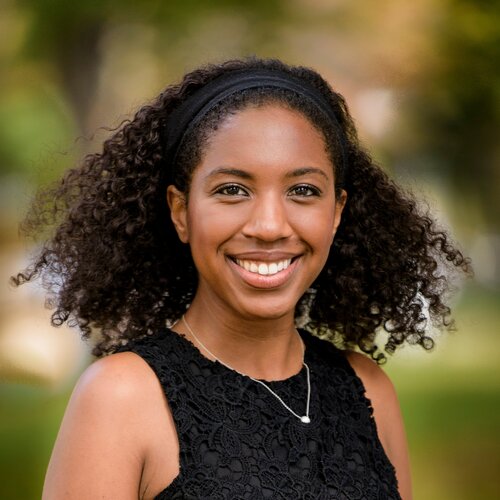
Gabrielle Sims is currently the
project associate at Shah Family Foundation. Previously she was the program associate for the Neighborhoods and Housing Strategy at the Boston Foundation and previously worked with Freedom House and NeighborhoodWorks America.
Want to learn more about Gabrielle? Check out her interview here with La Piana Consulting where she breaks down how she brings her values into her work, how she practices selfcare, and how she learned to reclaim her time.
Going PLACES: Small Incremental Change is Systems Change
By Sara Levine, Quality Schools Program Officer, The Rogers Family Foundation
Going PLACES is an occasional blog series featuring the voices and experiences of TFN’s PLACES Fellows. For more information on the fellowship, and to read past blog posts from our fellows, visit here.

El Paso appears like a man-made island surrounded by the vast emptiness of the west Texas desert, far from everywhere except Ciudad Juarez. From the air the cities appear as one between two dusty purple mountain ranges, the Rio Grande snaking through the middle. Through town, the border wall follows and departs from the river bed as the water runs intermittently through man-made channels and the unaltered land.
You might have heard that this border is the third-most militarized in the world. You also might have heard of the asylum-seekers — including children — who have died in US custody in the prison-like detention centers (in El Paso and elsewhere) that continue to hold thousands of separated migrant families.
I have heard these things about this border, and more, and have felt close to tears in the days leading up to our El Paso PLACES site visit.
The morning of our first day in El Paso our PLACES facilitator Bina M. Patel of Saathi Impact asks, “What do you carry with you?”
In my journal I write: Heavy heart. Sadness. Anger. Love. Eagerness to help. Appreciation for the PLACES cohort. Emotion running close to the surface.
In pairs we practice building new stories of a personal or professional moment that challenged us. How does it become a story of triumph without diminishing the experience? How can we as listeners, as witnesses, show up as healers?
Healing. El Paso continues to heal from loved ones lost to white supremacy and gun violence on Aug. 3d, 2019.
The border is, and has been, a gaping wound and a scar.
In conversations over the three days we are together, we keep returning to this question: How do we counteract systemic hopelessness? How do we
— how do communities — remain resilient? How can philanthropy support the work of movement building in the face of relentless sadness?
As witnesses and aspiring healers, we can’t take the bait of hopelessness. The status quo is exactly what they — the xenophobes, the white supremacists, the neoconservatives — want. Action is the antidote.
I am thankful to be in this place with my PLACES people.
We hear over and over again: El Paso’s history is textured by ancient land routes, by the constant movement of people, both forced and chosen. It is a city that rejects the “otherness” of a polarizing national narrative again and again. As Eric Summerford Person, president and CEO of the El Paso Community Foundation, says, “It’s who we were and who we are.” Learning about the foundation’s efforts to do agile, culturally responsive, community-driven grant-making is heartening.
El Paso has a deep-seated activist community. Inside the Chihuahuita Community Center, I am humbled by the work of Fernando Garcia, founding director of the Border Network for Human Rights (BNHR). With over 7,000 members, BNHR “supports immigrant border communities in the promotion of their human rights and the demand of human immigration reform that is consistent with human rights”. The criminalization of immigrants, the business of the border, is a moment 30 years in the making, with the last two years marked by increasingly outspoken white supremacists and emboldened armed militias. “We are building a movement,” Fernando says. “Sometimes we don’t see it, but it’s there.”
Small incremental change is systems change, Bina said in our first meeting. We don’t see it, but it’s there.
We meet with Krysten Aguilar and Marlene Yanez from La Semilla Food Center, based in Anthony, New Mexico. Krysten explains that in addition to the food education, food access, and economic development programs they run, La Semilla Food Center sees food as a tool to dismantle systemic racism, through participatory leadership, paying community members for their time, and explicit anti-racism training.
It’s not all hopeless, but the work is relentless.
We visit a shelter run by Annunciation House, a safe place for a night or two for asylum seekers who have been released, with nothing, from detention. Young families, older women and men. We awkwardly “tour” the center and then wait in the front vestibule of the building as the Assumption House staff finishes their business.
“Ustedes son migrantes?” one elderly woman asks when she sees us. Are we migrants? No no, we’re just visiting I say. She waves her hand and says, “No matter. All are welcome.”
A few minutes later a black-haired little boy no more than 4 years old runs into the bathroom and emerges far too quickly.
“¿Te lavaste las manos?”
Did you wash your hands? I ask in Spanish. He looks at his hands and smiles at me with the look of little boys everywhere who have not washed their hands. With a big smile he scampers away.
We are pulled into heartbreak but that’s not the end. It can’t be.
On our last evening together, we sing and meditate together while playing drums under the open sky. We need space to heal, too. I am thankful for this group of smart, thoughtful, deeply passionate and compassionate people. I am thankful for the joy I feel when we’re together and it is this joy, coupled with renewed commitment to action that I take home with me to Oakland.
About the Author
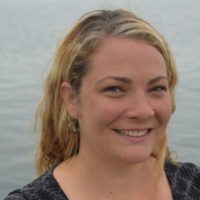
Sara Levine has worked in the non-profit sector for more than 15 years before joining The Rogers Family Foundation in July 2016. In her role, she leads the foundation’s strategic initiative to create the conditions for quality public schools for all children in Oakland, Calif. She previously worked with New York City Leadership Academy (NYCLA) where she consulted nationally and internationally with superintendents and central office leaders to transform their local education systems. Prior to working with NYCLA, Sara was program director at Worldfund (now Educando), where she designed and launched the LISTO program, a leadership development program for public school principals in Mexico. Sara also spent three years as the director of Raising a Reader Alameda County, an early childhood literacy program, several years working in community development projects in rural Oaxaca, Mexico, and time as a teacher in Los Angeles, Calif., and Madrid, Spain. Sara holds a Bachelor of Arts from Yale University and also earned her Master of Arts in International Affairs with a concentration in Development and Latin America from George Washington University. Sara is proud to be a 2019 PLACES Fellow with the Funders’ Network. Sara lives in Oakland.

